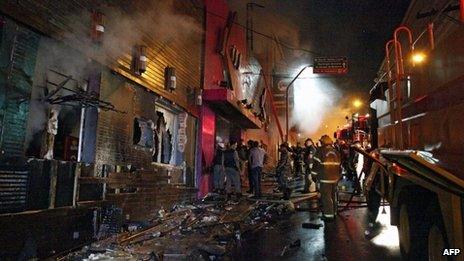Brazil nightclub fire: Four charged with manslaughter
- Published

Four people in Brazil have been charged with manslaughter in connection with the deaths of 241 people in The Kiss nightclub fire in January.
Two nightclub owners and two members of the band playing as the fire began are accused of "negligent homicide".
A police inquiry in the city of Santa Maria found that the fire was triggered by fireworks used by the band.
Most of the victims died after inhaling the toxic smoke produced when ceiling insulation foam caught fire.
Investigators also criticised the fact that the venue only had one exit.
The police investigation identified 16 potential accused, of which eight have been charged.
Four people were charged earlier for obstructing the course of justice, including two firemen accused of hiding evidence that the club's fire licence had expired.
Nightclub owners Mauro Hoffmann and Elissandro Spohr and two members of the Gurizada Fandangueira band, Marcelo de Jesus dos Santos and Luciano Bonilha Leao, face trial for manslaughter.
Prosecutor Joel Dutra said the four men knew of the possible impact of their actions and failed to act.
"To die through the inhalation of toxic fumes is a cruel way of dying," he said.
"The reason they died was the search for profit, through the use of inadequate fireworks and highly inflammable foam on the nightclub's ceiling."
The police report published in March said dozens of eyewitnesses reported seeing the singer on stage holding the firework which triggered the blaze.
Attempts by the singer and a security guard to extinguish the fire failed when the extinguisher they used did not work, the witnesses said.
Many said that the security guards at the club at first tried to stop people from leaving the club, which was found to be overcrowded.
The fire, and the lack of safety precautions at the venue, have prompted widespread concern about Brazil's ability to host major sporting events in the next four years.
The 2014 World Cup is set to be played in 12 Brazilian cities, while the 2016 Olympics are to take place in Rio de Janeiro.
- Published22 March 2013
- Published2 March 2013
- Published30 January 2013